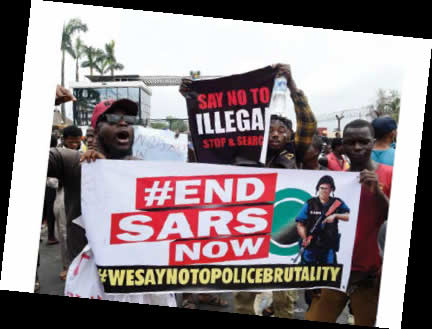
THE massive youth protest movement, tagged #EndSARS, against decades of brutality by Nigerian Police that climaxed with killings at the Lekki Tollgate Plaza, Lagos, is still fresh in the memory two years after. The youth had taken to the streets across the country in peaceful marches to protest the constant harassment, killings, and extortion by police officers. After several days, and a hijack of the protests by hoodlums and petty criminals, Nigerian Army troops and armed police officers assaulted peaceful youths massed at the toll plaza, firing teargas and bullets. When the smoke cleared, several persons had died, others injured, and left citizens traumatised. The heroes and martyrs of that brave movement should never be forgotten.
The #EndSARS movement reverberated, attracting global attention to the plight of the Nigerian youth, and beamed a searchlight on the repressive regime of the President, Major General Muhammadu Buhari (retd.), and the callousness of Nigerian politicians. With Lagos as its epicentre, protests spread to many cities across the country.
The trauma has not ended; precise figures of the casualties in the protests, the cataclysmic denouement in Lekki on October 20, 2020, and the violent riots it provoked, are disputed. But several persons died; civilians were mowed down in Lekki and other places. Police also suffered casualties as criminals capitalising on national and global outrage, attacked police stations, prisons, public and private buildings, and murdered police officers.
Spirited attempts have been made by the Buhari regime and the ruling party to criminalise the youth and the protests, play down the casualties, and cover up the brutal official response. They have failed, largely because of extensive coverage by mainstream domestic and international media.
Particularly irksome to the regime was the role of social media in highlighting the grievances, course, and reactions. Quartz Africa reported that the hashtag, #EndSARS, had been shared 26 million times on Twitter alone some days into the protest to the discomfort of the regime, which later suspended the platform in the country.
Liberty, fundamental freedoms, right to justice, accountability by public officers and enjoyment of democracy and good governance are never given on a platter; citizens must constantly insist on them through all lawful actions. UN’s Office of the High Commissioner for Human Rights declares that everyone has the right to peaceful assembly, including sit-ins, strikes, rallies and protests, both offline and online. The Open Society Foundations, an NGO, says, “Protests are a catalyst for social change, and are essential for citizen participation in a pluralistic democracy.”
Unfortunately, Buhari and regime operatives are unfamiliar with the dictates of democracy. Their response to protests has been repression, and a strong aversion to the mass media.
After violently suppressing the protests, the authorities eventually agreed to some of the demands, including the dissolution of the Special Anti-Robbery Squad, the notorious police outfit responsible for uncountable atrocities against Nigerians, especially the youth, and better welfare and pay for police. It also agreed to judicial panels of inquiry in each state to unravel the crisis.
But it has left other things undone: it has failed to truly reform the police; it has not undertaken a sweeping punishment of the SARS officers save for a handful being prosecuted. And while some states like Lagos have compensated the families of slain police officers, the families of the civilian victims killed, or others who were brutalised during the protests have been ignored.
The hijack of the protests and the government’s high-handed response cost the country dearly. About 22 police officers were killed by hoodlums. Buhari said 69 persons died: 51 civilians, 11 police officers and seven soldiers. Figures of the Lekki killings remain controversial. While eyewitnesses and major global media gave figures ranging from 11 to 30 dead, the Lagos judicial panel said nine persons died out of 46 unarmed protesters shot. But even this was disputed by the state government, which insisted that no one died at Lekki.
Lagos-based Financial Derivatives Company put the economic cost at N1.5 trillion, approximately 1.03 per cent of national GDP, or 11.47 per cent of the 2021 budget. The regime said it would increase the police staff strength (currently 370,000) by additional 50,000 personnel by 2025.
The battle is far from over. Though SARS is officially disbanded, after only a few weeks of restraint, police officers across the country promptly resumed their oppressive, extortionist and violent ways. Sulking at the protests, some police officers have become even more vicious. In fairness, often, those exposed and reported to the authorities are disciplined and some dismissed. But the problem is pervasive and systemic. The force requires total overhaul. Buhari, the Police Service Commission and the Inspector-General of Police should initiate reforms.
Moreover, no fewer than 32 #EndSARS protesters still languish in prisons two years after. While 23 protesters are incarcerated in Ikoyi and Kirikiri prisons, Lagos, nine protesters are being held in Oyo State. Except for hoodlums who robbed, vandalised, or torched public and private property, they should be released. Those with plausible criminal cases should be quickly prosecuted.
The rights to expression and freedom of assembly are guaranteed by the Nigerian Constitution, and by the African Charter on Human and Peoples Rights. Similarly, Police Establishment Act, 2020 charges the police to provide security for the public rallies and meetings. A subsisting Court of Appeal ruling declares that obtaining a police permit as a precondition for holding rallies in Nigeria is unconstitutional. But police continue to insist on permits.
Battered by an unfavourable environment, unemployment of over 50 per cent and police brutality, the youth should never give up. The youth were the vanguard of mass movements that toppled years of military dictatorship in South Korea; the youth and women of Iran are currently braving the brutal rule of clerics demanding their fundamental freedoms.
The heroes of #EndSARS, especially those killed, maimed, or sent into exile should never be forgotten. The youth, and all Nigerians should persistently exploit all lawful and peaceful means to press for justice and the right to live in dignity.





